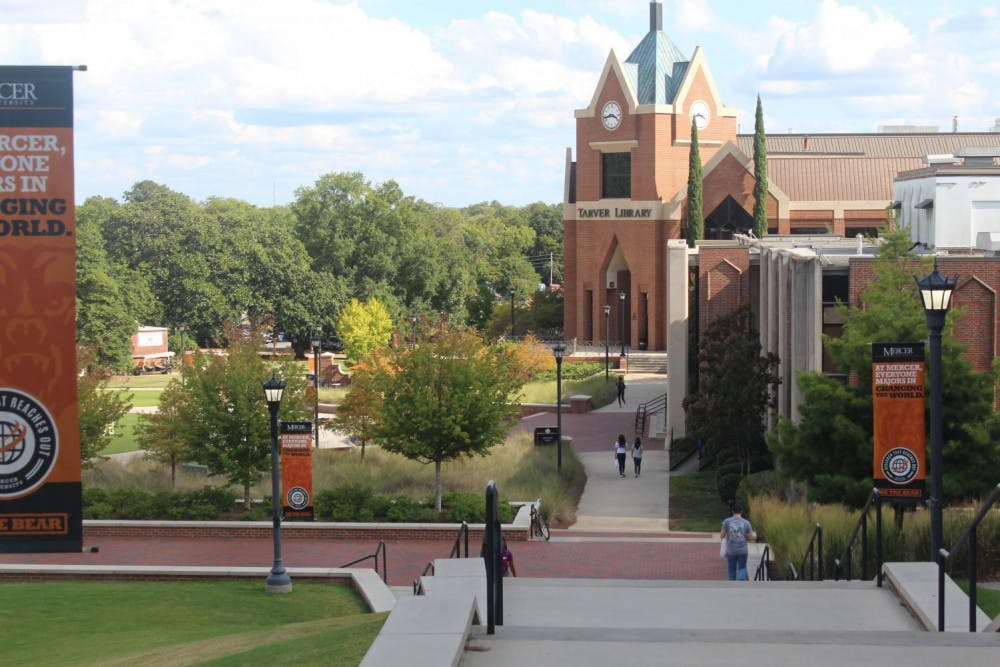This story was updated Aug. 22 to include more information about the fall semester.
Mercer Bears have returned to campus for the fall, but the semester ahead will be anything but normal.
Revised calendar
The last day of classes will be held Nov. 24. Classes will meet on Labor Day, and Fall Break will not be observed. Final exams will only be offered online and will take place Dec. 3-4 and Dec. 7-9.
"The revised calendar will minimize travel-associated breaks, meet accreditation-mandated contact hours per credit hour requirements, preserve the general university calendar and minimize online instruction for face-to-face courses," Mercer University Provost D. Scott Davis said in an email June 11.
Mercer is not the only college or university to update the academic calendar for this fall. Responding to potential threats of a "second wave" of the disease that has claimed more than 169,000 American lives, institutions including Michigan State University, Virginia Polytechnic Institute and University of Notre Dame scheduled to end their semester or transition to online learning by Thanksgiving, as reported by Inside Higher Ed. Many schools have also chosen not to offer a fall break.
Angel Colquitt, a senior journalism major, said that a lack of breaks will take a toll both personally and academically.
“Every year since I was 12, my dad and I have gone to Atlanta over Labor Day weekend,” they said. “I’ve already missed out on one of our trips we take because of COVID-19, and now Mercer is getting in the way of us getting to go to our convention this year in the chance the convention still happens. It’s really upsetting.”
Colquitt also said that one of the symptoms of their disability is brain fog, a sense of disorientation, confusion, disorganization or inability to concentrate or remember information. Sometimes, it’s hard for them to focus in class or complete assignments. They worry that a lack of breaks could cause them to fall behind.
“I use our breaks during our semesters to catch up on my studying and get ahead on my assignments. I’m not sure how I’m going to be able to keep up with this,” they said. “If my GPA suffers because of this decision, I don’t know what I’m going to do.”
Safety and health initiatives
A truncated schedule isn’t the only change Mercer has in store for the fall. Administration previously announced several new initiatives to reduce the transmission of COVID-19 on campus.
Some of the changes include “ubiquitous” hand-sanitizing stations, modifications to dining services, rearranged classrooms to allow for social distancing and contactless temperature checks at entrances to some classrooms.
Masks are required in all indoor classrooms, hallways and common areas, except for in laboratories if an instructor deems face coverings unsafe. According to Mercer’s Coronavirus FAQ webpage, masks are mandatory at all times unless “alone in an enclosed office or study room, in campus outdoor settings where social distancing requirements are met, for students in their own residential room or suite, when eating in campus dining facilities or while exercising.”
Students were also provided a Bears Care Kit upon returning to campus. The kits contained a cloth mask, a two-ounce bottle of hand sanitizer, a digital thermometer, a sticker with a list of COVID-19 symptoms and phone number for the Student Health Center, a pin and a pledge card “to promote personal responsibility” during the pandemic, according to Mercer’s Coronavirus FAQ webpage.
Social distancing will also be enforced in academic contexts. Mercer’s registrar updated classroom meeting times July 30 to provide 20-minute breaks between courses rather than the usual 10 “to allow for social distancing, temperature checks and hand sanitization,” according to the registrar's website.
Student questions the precautions
Rising third-year Adri Rosario said that while she appreciates Mercer’s increased health initiatives, she worries that they don’t cater to residential students who are at high risk for contracting COVID-19 or developing more severe symptoms, especially since most students are required to live on campus under the three-year housing requirement.
“I wish the (plan) included particular resources for those who are high-risk because without such resources, this population is left behind to make hard decisions for their health and education,” Rosario said. “In fact, I think any student has a right to be nervous about returning to dorms where there are many shared spaces.”
Rosario is taking the fall semester off from her studies at Mercer.
Student Health Center hotline
If students develop symptoms, the Mercer Student Health Center will continue to operate a 24/7 hotline that can provide evaluation and, if necessary, referral to a Mercer physician. The hotline can be reached at (478) 301-7425.
Tests will also be available through Mercer Medicine. Any residential student who tests positive will be able to self-isolate on campus, according to Mercer’s student-centered website The Den.





